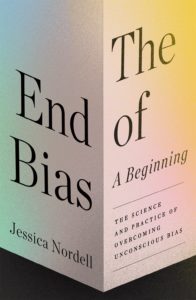In THE END OF BIAS: A Beginning: The Science and Practice of Overcoming Unconscious Bias (opens in new tab), author Jessica Nordell uncovers the unconscious bias in our everyday lives and shows how we can begin to remake ourselves and our world. But today she’s joined us to share about her connection to libraries!
I understand you wrote a lot of this book in the library. Can you share more?
Yes! I have a cult-like devotion to my beloved Hennepin County Libraries. My home office is teeny and often occupied by a meowling orange cat. Libraries are virtually the last place on earth where there’s actual silence! I often camped out in the meeting rooms of the Hennepin County libraries–I particularly love the Sinclair Lewis room at the Edina branch. You can only reserve a room for two hours, so I’d reserve one room for the max time, then decamp to a different room, then a third, like a wandering library vagabond.
How else did you use the library system while writing this book?
One of the most spectacular features of the Hennepin County system is live, on-call, virtual library support. Anytime I got stuck with a research task–like trying to track down an obscure 1970s study on discrimination, or an out of print book like THE IMPACT OF TELEVISION–I’d ping the librarian on call. They were incredibly helpful, and helped me with esoteric research requests, interlibrary loan requests, and more. But always semi-anonymously. Mystery librarians of the HCLIB, know that you are appreciated!
Also, the ability to reserve any book and then pick it up at your nearest branch feels like magic. (Though I think I’m like number 734 in line for Norma Kamali’s memoir at the moment.)
How did your love of libraries begin?
Our little Brown County Library in Green Bay, Wisconsin had an incredible children’s librarian when I was a kid– her name was Karen Prevetti, and she had this spiky, short dandelion-like hair. She’d thrust books into your hands and they were always the right ones. She also started this ragtag group of older kids who read stories to younger kids called the “Treetop Storytellers,” and I joined. Then when I was a young itchy teenager in a small town, being able to check out all these art and poetry books, was a portal to a bigger, wilder world.
What do you read outside of work?
My main reading for the last five years has really revolved entirely around bias, discrimination, patriarchy, racism, child development, the social sciences in general, and into fields like Assyriology, Nubiology, and Egyptology. To step back from the human, I love reading about permaculture, native plants, and geology. I’m a huge fan of memoirs–currently reading Peter Balakian’s BLACK DOG OF FATE, which is incredible, and just read Rebecca Caroll’s wonderful SURVIVING THE WHITE GAZE. And poetry. Basically anything that helps me understand the world in new and surprising ways.
Anything you want librarians to know about your new book?
The book is really meant for anyone who is interested in reducing bias–in themselves, in their community, in the organizations or companies to which they belong. The problem is more urgent than ever, and it’s everywhere. There’s no domain that’s not touched by bias in some way. My goal is to present the insights and strategies for change in an accessible, compassionate way–to try to bring along as many people as possible in the urgent task of tackling discrimination. I’d love to hear what you think!

